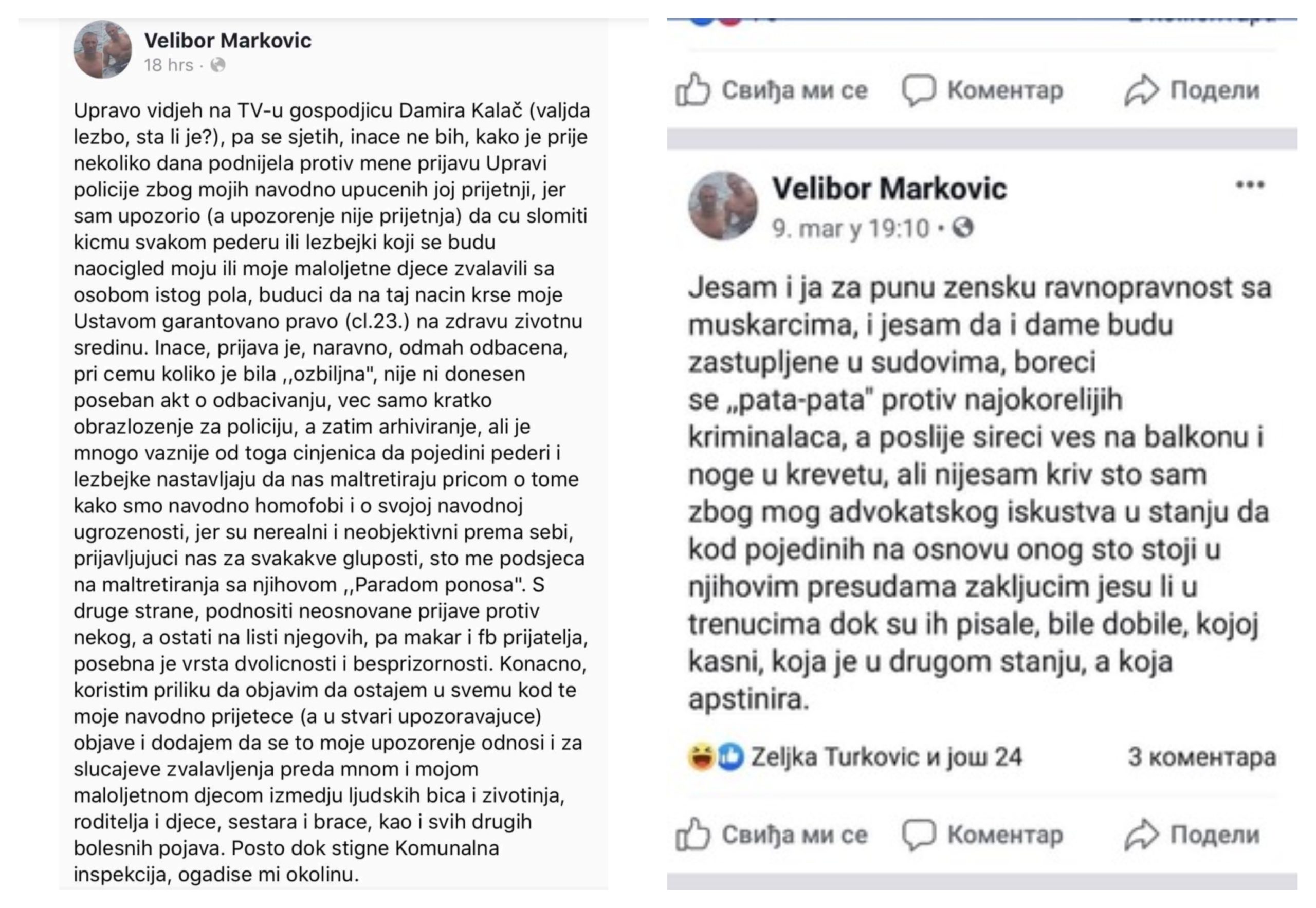
27 YEARS SINCE THE SREBRENICA GENOCIDE
11/07/2022
HUMAN RIGHTS ACTION WILL NOT PARTICIPATE IN AN EXPERT TEAM WHOSE MEMBER PROMOTES HOMOPHOBIA AND SEXISM
22/07/2022HUMAN RIGHTS ACTION ON THE DRAFT LAW ON AMENDMENTS AND SUPPLEMENTS TO THE LAW ON THE JUDICIAL COUNCIL AND JUDGES

The Draft Law on the Judicial Council and judges represents a step forward in fulfilling the recommendations given over the years by international bodies with the aim of creating an independent and impartial judiciary. However, the changes had to be on a larger scale. It is necessary to ensure the depoliticisation of the Judicial Council by further specifying the requirements for the election of eminent lawyers, in order to be certain to prevent people who have resigned from political office only a day before the election from becoming members of the Council. We will continue to advocate that the members of the Judicial Council also be proposed by non-governmental organisations, as it is prescribed for the Prosecutorial Council. The round table on amendments to the Law, which was held yesterday, was premature and should therefore be repeated at the end of the public debate, once all interested parties have submitted comments.
The Ministry of Justice’s degree of transparency and willingness to involve the public in changes to the Law was significantly higher than that of last year, in the case of changes to the Law on the State Prosecutor’s Office. HRA believes that it would be important to include the Venice Commission in the process of drafting the Law.
The Ministry of Justice published the Draft Law on Amendments and Supplements to the Law on the Judicial Council and Judges on Monday, 11 July 2022, along with the invitation to a public debate that will last for the next 30 days. Public debates are necessary in order to ensure the best possible quality of regulations, and to increase the trust of the citizens – and especially the professional public – in the democratic process which serves to fulfill a public interest. This is particularly significant if one takes into account that a public debate was absent last year, when the Law on the State Prosecutor’s Office was being amended.
Yesterday’s round table, organised with interested members of the public, was planned to be held as part of said public debate. We believe that the Ministry of Justice should have organised the round table later in the course of the debate, or even after it ended, in order to provide everyone with the opportunity to familiarise themselves with the changes and to prepare in an adequate manner. We hope that the Ministry of Justice will organise another round table after the end of the public debate. In this way, the Ministry would encourage everyone to take an interest and contribute to making one of the most important judiciary laws as good as possible.
It is a fact that these amendments represent the first significant changes to the Law on the Judicial Council and Judges since 2015 (not counting the legal intervention that extended the mandate of eminent lawyers in 2018), and that the Draft Law contains 79 articles, of which almost every single one contains several significant changes regarding the composition and election of members of the Judicial Council, the selection of candidates for judges, judges, and court presidents, the procedure for evaluating and determining the responsibility of judges, and the wording of disciplinary offences. Also, during the previous week, two days were non-working days because there was a national holiday, which left an insufficient amount of time, i.e. only two working days, to prepare for the round table.
The working group members themselves also ought to have been provided with more time to prepare for the round table. International experts of the Council of Europe – Mr. Djuro Sessa, president of the European Association of Judges, former president of the Consultative Council of European Judges and former president of the Supreme Court of the Republic of Croatia and Mr. Gerhard Reisner, former president of the European Association of Judges and the International Association of Judges, and member of the Consultative Council of European Judges – recently commented on the latest working version of the Draft Law. We are hereby inviting the Ministry of Justice to publish on its Internet presentation the comments of international experts of the Council of Europe on the proposed legal solutions, and thus establish a new good practice.
The Working Group that worked on the amendments to this Law was established in early October 2021; it included HRA’s legal adviser, Marija Vesković, who was selected on the proposal of 11 non-governmental organisations. Our main goal was to advocate in the Working Group for the consistent introduction of guarantees against conflicts of interest for all members of the Council, as well as guarantees of independence from political influence for members who are elected from among the ranks of eminent lawyers. This goal has been largely achieved. The Draft Law includes provisions on the prevention of conflicts of interest and independence from political influence for all the members of the Judicial Council, which also fulfils the recommendations of the Group of States against Corruption of the Council of Europe (GRECO) and the European Network of Judicial Councils.
However, as for members from the ranks of judges, a difference was made – without a justifiable reason – in relation to the time limit for the election of persons who were previously politically active.
Thus, according to the proposed solution, former officials of political parties cannot be elected as members of the Council from the ranks of judges if they held those positions in the previous ten years. However, for an unknown reason, the requirement is more lenient when it comes to politically engaged persons and former members of the Government, who are required not to have held those positions in the previous five years. We believe that requirements should be equalised in terms of previous political involvement, because that is the only way to achieve complete independence from political influence.
Imprecise wording also exists regarding members from the ranks of eminent lawyers, also in relation to persons who are politically connected. Specifically, in the case of former political officials, the period of time during which these persons cannot apply to become members of the Judicial Council is not specified at all, creating serious danger that the Judicial Council will in the end have members who have resigned from their political office only a day before submitting their application.
To prevent possible abuses and achieve complete depoliticisation of the Judicial Council, HRA proposes that the requirements for the election of persons who are not politically connected be made equal to those relating to all the members of the Judicial Council.
A significant number of other HRA recommendations and proposals also found their way into the Draft Law. These included our proposals related to the composition of the Commission for the Code of Ethics of Judges; requirements for the election and dismissal of these members, which were not prescribed before; limitation of the mandate of members of the Judicial Council; the postponement of the execution of the decisions of the Judicial Council until the conclusion of the administrative dispute; the authorisation of the members of the Judicial Council which, for the first time, allows them to initiate disciplinary proceedings against judges; the possibility of removing candidates from further election procedures in case of cheating on the test, etc. However, the wording of the disciplinary offences should be specified even further, in order to distinguish them from the violations of the Code of Ethics. The following provisions should also be included:
- On preventing conflicts of interest among all members of the Commission for the Code of Ethics of Judges, as these provisions currently apply only to the president of the Commission;
- On the disqualification of members of the Commission for the Code of Ethics of Judges;
- Two members of the Judicial Council should be elected from among the judges of the Supreme Court, the Appellate Court, the Administrative Court, the High Misdemeanour Court and the high courts, while two should come from the ranks of judges of basic and misdemeanour courts;
- On the election of members of the Judicial Council from among the ranks of judges;
- On the nomination of members of the Judicial Council from among eminentlawyers by institutions and professional associations such as the Bar Association, law faculties and non-governmental organisations;
- On the requirements for the election of judges of the Supreme Court;
- On the right to inspect the documentation of other candidates in the process of electing judges, for the purposes of initiating an administrative dispute;
- On the performance evaluation of judges, which would enable the quality of the work of judges to be evaluated in relation to the decisions of the Constitutional Court and the European Court of Human Rights, which in fact represent the evaluation of the work of judges in the application of the Constitution and international treaties on human rights;
- On the criteria for evaluating judges that would pay special attention to the respect of judicial ethics;
- On the disciplinary responsibility of judges, so that the authority to initiate disciplinary proceedings is also entrusted to the disciplinary prosecutor.





 English
English